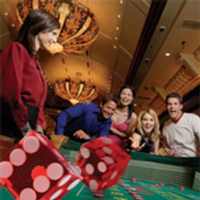
Casino games are designed to have a negative expected return. If you play in a casino, over time you’re be expected to lose some money because the casino has set the odds so that you’ll lose more often than you will make it. Casinos actually exist because people are willing to pay money, by losing it, to experience risk.
The stock market as a whole, instead, should have a positive expected value. If you passively hold onto a broad market index of stocks, you should make money over time. The stock market exists to give investors a positive return, in exchange for taking on risk: that’s because people are basically risk averse.
Still, if we’re thinking about a casino game like poker, where you are not playing directly against the house, and about short-term trading investment, then there is a bit more in common.
Both are zero sum, that means that someone has to lose for someone else to win, even if either gambling and trading are not precisely zero sum games, since slippage, commissions erode however slightly the account, as if you put a chip on the table.
Stock brokers create liquidity and other benefits for the market, depending on what kind of trading they’re doing, while in a casino, you’re mainly creating profits for it.
Stock brokers usually consider themselves much superior to gamblers. Yet, there actually are some things that stock brokers could learn from professional gamblers:
- Gamblers Anonymous‘ serenity prayer: “God grant me the serenity to accept the things I cannot change, courage to change the things I can, and the wisdom to know the difference.” Stock brokers should aim to achieve the serenity to accept folding a losing hand, the courage to take the calculated risk and the wisdom to know the difference.
- Cut losses and run winners: same as in poker money is made by folding and being aggressive when required, successful stock brokers spend their time cutting losses.
- Position sizing: Think of blackjack: even if it’s a game where you play against the house and it’s made to let you lose, Edwin Thorpe developed his game theory based on position sizing, a fraction of Kelly criterion, that several stock brokers try to adapt, since many position sizing algorithms used in finance come from game theory, like martingale, reverse-martingale, drawdown/run-up of bankroll, Kelly Criterion, etc.
- It is work: professional poker players and good stock brokers do it as their job. It is not meant to be fun. They leave their emotions out, a great advantage on the emotional players.
- Have a system, a habit: same as smart gamblers do, have smarter gambling habits: adhering to a system takes discipline, reinforced discipline is going to be your habit.
- Quantify your risk, not an abstract dissertation at the end of an investment thesis, but as a hard cold probabilistic number.

- Odds and win rates: traders walk into a trade expecting it to win, but they must be also mentally prepared for a loss. Think back to the serenity prayer: making money means knowing when your style is out of favour and betting small and then when in favour take risks.
- Those that have devoted themselves to an in-depth understanding of the logical and mathematical realities of poker can earn a living doing so, especially if they target tables in which their competitors’ weaknesses can be more readily exploited (think of all players and professionals affected by the Dunning-Kruger Effect and the Peter Principle, fancying themselves extremely skilled, despite any objective evidence!), and their own strengths can be more efficiently put into action.
The careful analysis seems to be the main difference and the main lesson stock brokers can gain from professional gamblers. In fact, there’s nothing safe or guaranteed when it comes to earning money – be it starting a business, gambling or investing in the stock market. But when one takes a trade or invest, he’s taking a decision based on the data he has at his disposal. The best stock brokers are the ones who enter into a position when the probability of success are high. Those traders who don’t carefully analyse data before entering a position tend to lose their money.
